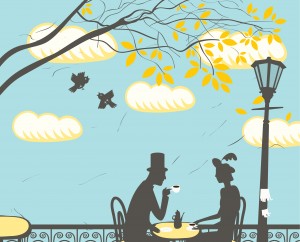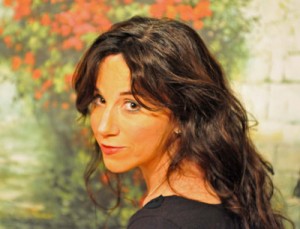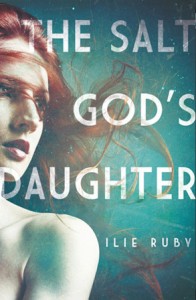Working in Concert: Editors Support the Author’s Voice
By Guest | September 30, 2012 |
 Today we’re excited to share a rare, intimate exchange between author and editor about a book’s process.
Today we’re excited to share a rare, intimate exchange between author and editor about a book’s process.
In this interview, Editor-at-Large Dan Smetanka and author Ilie Ruby discuss the inception and editorial process for Ilie’s latest novel, The Salt God’s Daughter, just published from Counterpoint/Soft Skull Press.
Ilie: I should begin by saying that The Salt God’s Daughter was unlike anything I’ve ever written—in part, because of the way the deal was negotiated and because I’d never written a novel on a tight deadline. My first novel, The Language of Trees took me ten years to write. That decade was all about healing from an autoimmune illness and the book is all about second chances and perseverance. Dan read Salt God in its very early stages. We’d been in touch for years and I knew we shared an aesthetic.
Dan: In my twenty years in publishing it never ceases to amaze me when I see an author truly hit their stride. It’s a special and amazing thing, like lightning in a bottle. What struck me with this project was how these characters and these themes appeared fully formed as if they were guests we had invited into a room. I got to meet them, learn about them, and watch their stories unfold, and was completely taken with the story in its very early stages. They were singular, specific yet universal at the same time. This book for me manages to be both epic and intimate— a very hard thing to pull off in a novel.
Ilie: Dan and I agreed on a deadline, which meant we’d be working intensely together for months. This was a deeply personal book, probably the most intimate story I’ve ever written. I felt from the beginning that he was as passionate about the story as I was. The vernacular is ethereal realism, combining mythology and folklore with a modern-day storyline and this particular novel was a re-imagining of a Scottish folktale about the selkies. The book was inspired by the real-life stories of seventeen young girls who endured harrowing rites of passage. But ultimately it’s a book about survival.
Dan: The editorial process is of course different with every book, so for me and Ilie, we worked our editorial time around my busy office life and her busy family life. While this is not common, I trusted Ilie’s instinct and knew she’d deliver. We were on the right path from the get-go. One of the big secrets of publishing is that editors rarely have time to edit during the day—the editing happens at night. I’m in LA; Ilie’s on the East Coast and so it was feasible for us both. With coffee and energy drinks.
 Ilie: I remember the day I sent in the final pages of the book. I had been reworking the ending and by that point, I had a gut feeling it was right. When he called to say the book was done, it was a threshold moment. Of course I took a little time off to celebrate.
Ilie: I remember the day I sent in the final pages of the book. I had been reworking the ending and by that point, I had a gut feeling it was right. When he called to say the book was done, it was a threshold moment. Of course I took a little time off to celebrate.
Dan: Once we had finished the editorial process and I knew Ilie had written an amazing piece of fiction, it was time to let the rest of the world in. This includes sharing material in-house, with our publisher, marketing, publicity, and sales reps. This also includes creating galleys in time for Ilie’s appearance at Book Expo America, one of the largest book fairs in the country, where publishers historically feature their lead fall titles and begin the outreach to the community of booksellers.
This also included organizing support in communities important to this project: the author’s home town, other key areas of support from her first novel, as well as the West coast where the book takes place, and specifically Los Angeles which has a burgeoning literary community and a host of thriving independent bookstores. Through all of this we were able to map out a four-week tour, no small feat in a competitive fall book season.
Ilie: Choosing the book cover was the least stressful task in the entire editorial process (for me). I can’t begin to describe how thrilled I was that we had a few beautiful covers to choose from.
Dan: It’s always a journey to create a visual representation of a book. This is especially true for fiction. But once again, lightning in a bottle. To me, this cover arrived like these characters, fully formed and patiently waiting for us to see them. I saw this cover and knew it had to be the one. That rarely happens.
Ilie: One of the things we talked about throughout the process was where this book would fit into the marketplace. It was absolutely women’s fiction but because of the style, the vernacular, the fact that it encompasses modern-day feminism and because of the more gritty scenes, we had many interesting discussions.
Dan: It’s important to have a sense of where your work will ultimately fit into the marketplace. It’s important to trust your vision and yet be open to other interpretations of your work at the same time. Usually there is no one path to revisions. There is no one way to edit a book. Yet, when an editor and writer share the same vision, anything is possible.
 Ilie: Since the book’s debut on September 4th, what has struck me more than anything are the beautiful letters I’ve received from women. I feel like I’ve been given a prolonged lesson in endurance—on pushing myself beyond where I believed I could go, both physically and in terms of my writing. I agree with writer Elizabeth Rosner, who says, “I still believe in the redemptive power of storytelling to heal and transform our world.”
Ilie: Since the book’s debut on September 4th, what has struck me more than anything are the beautiful letters I’ve received from women. I feel like I’ve been given a prolonged lesson in endurance—on pushing myself beyond where I believed I could go, both physically and in terms of my writing. I agree with writer Elizabeth Rosner, who says, “I still believe in the redemptive power of storytelling to heal and transform our world.”
Ilie Ruby is the author of The Salt God’s Daughter (Counterpoint/SoftSkull 2012) and The Language of Trees (William Morrow 2010), a Target Emerging Author’s Pick. She is the winner of the Edwin L. Moses Award chosen by T.C. Boyle and a Kerr Foundation Fiction Scholarship. Ilie’s articles have appeared in the New York Times, CNN, and others. You can learn more about her and her novels on her website, and connect with her through Facebook or on Twitter.










I love this post! It’s nice to see author and editor on the same page (so to speak). You both seem very supportive of the other, but you are also pushing each other in new directions. Thanks for sharing, and I’m looking forward to reading The Salt God’s Daughter!
Ilie and Dan,
Thanks for this insider’s view of the relationship between writer and editor. I suspect it is different with each writer and editor, but the two of you seemed to be in synch. Congratulations to both of you and good luck with your new book.
Laura, thank you. I actually really enjoyed the process of writing and editing the book. CG, it is so interesting, isn’t it? Moreso because it is different for each book. Chemistry and timing play a role, too. Thanks so much for your comments, folks!
Congratulations on the The Salt God’s Daughter, and thank you to both Ilie and Dan for a really cool glimpse into the process of writing and editing to publication.
PS I love the Elizabeth Rosner quote at the end.
Thank you both so much for this look at how editors support authors. Best of luck with what sounds like a fascinating novel!
Thank you for this inside look at the editing and publishing process. Your dedication certainly seems to have paid off!
Bernadette, Thank you! Liz is a wise woman! LynDee, I love your longer first-person bio on your website (I just read it!)
The book sounds wonderful! I haven’t heard of ethereal realism before, but I know an author who writes them, and didn’t know what to call them. Will pass this on to her.
This is going to sound all woo-woo mystical of me–what’s new?–but either you two are phenomenal actors, or you would seem to have a unique and beautiful working relationship. It sounds like you began as new-old partners and only developed from there. I can’t help thinking how good that would be for a book.
The book looks absolutely stunning and I’m already dying to read it, given this is exactly what I’ve been looking for. I’m glad you had such close interaction with your editor as you worked on this, I’m sure it won’t disappoint.
Thank you both for an insightful interview. Your book sounds very compelling, Ilie. I look forward to reading it! (Love the cover, too.)
Jan, I love the mystical insight. You’re absolutely right! Margaret, I hope you like the book, let me know. Cindy, your welcome, I hope you enjoy the book! Have a nice weekend, all. —Ilie